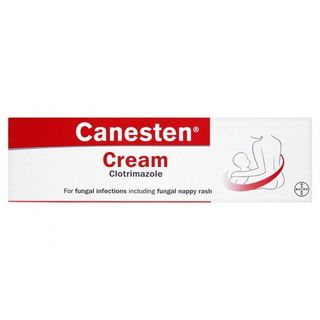
Thrush
Thrush is a fungus that thrives in warm and moist environments. Unfortunately for us, that includes human genitals. Though it’s more common in women, thrush can affect men too. It causes a thick, white discharge from either the penis or vagina as well as itching and irritation. We know that the symptoms of thrush can be a little alarming, especially if this is the first time you’ve had it. Our friendly team can talk you through the different treatment options, from anti-fungal cream to tablets and pessaries, to find the medication that’s right for you.
Thrush Treatments
 Canesten 1% Cream£7.9735 reviews
Canesten 1% Cream£7.9735 reviews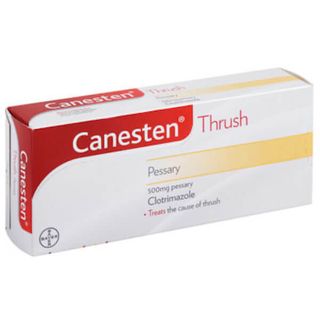
Canesten Pessaries
Canesten Pessariesfrom£6.6982 reviews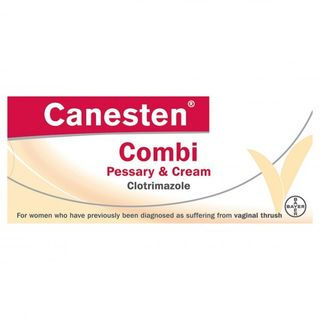
Canesten Combi (Pessary & Cream)
Canesten Combi (Pessary & Cream)£11.4911 reviews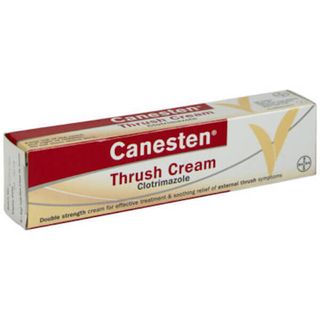
Canesten Thrush Cream
Canesten 2% Thrush Cream£6.4989 reviews- Out Of Stock
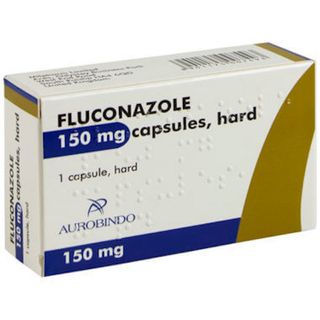
Fluconazole Thrush Capsule
Fluconazole 150mg Thrush Capsule£6.9980 reviews - Out Of Stock
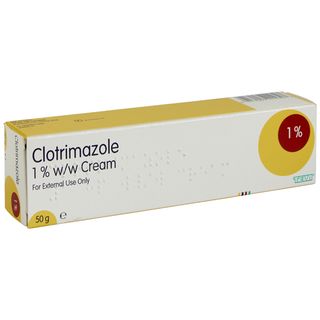
Clotrimazole Cream
Clotrimazole 1% Cream£5.9977 reviews - Out Of Stock
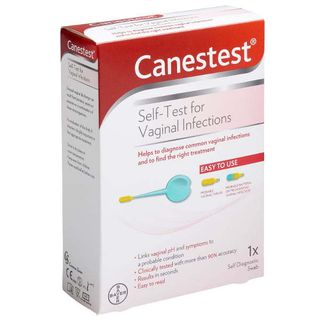
Canestest
Canestest7 reviews - Out Of Stock
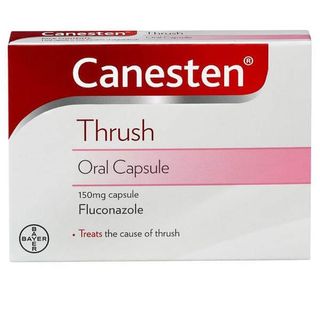
Canesten Oral Capsule
Canesten Oral Capsule11 reviews
View recommended products for Thrush
Don't wait to get the medical help you need.
View our recommended treatments and select your preferred treatment and quantity from a list of options for you.
Selected by our UK-based medical team
Quick and easy checkout
Treatments dispatched same day (before 3pm)
Ordering as easy as 1, 2, 3
1. Find the ideal treatment
We can provide over 1099 leading medicines to treat over 94 conditions.
2. Get a free consultation
Our qualified healthcare professionals will assess your condition and needs.
3. Enjoy speedy delivery
And when the time comes to re-order, it'll only take a couple of clicks.
Advice for Thrush
What is Thrush?
Vaginal thrush (normally known as thrush) is a very common yeast infection that will affect most women in their lifetime. It is more common amongst women in their twenties and thirties. It is less common in women who have gone through the menopause or for girls who have yet to start having periods.
Thrush is caused by the yeast-like fungus called Candida Albicans. Normally, vaginal secretions and ‘friendly’ vaginal bacteria keep this fungus at bay. However, if the natural balance within the vagina is upset, the Candida can multiply and cause vaginal thrush. The resulting infection is usually quite harmless, though it can prove to be irritating and uncomfortable.
Normal symptoms of vaginal thrush include swelling and itching of the vagina and the surrounding area. They may also include a white, cottage cheese-like discharge. Thrush is easy to treat with a wide array of prescription and non-prescription medicines.
Penile thrush (normally known as male thrush) is caused by the same fungus, Candida Albicans, as vaginal thrush. Thrush is less common in men than women, however, it can still be easily treated. Similarly to vaginal thrush, the Candida yeast lives normally on the genitals and only causes penile thrush when the normal balance of microbes is upset. This can be due to taking antibiotics, not drying your penis properly, using perfumed soaps or shower gels, or having a weakened immune system.
What causes Thrush?
The condition known as thrush is a form of yeast infection caused by a fungus that is naturally occurring in the vagina and on the penis. In around 80% to 90% cases of thrush, the cause is the fungus known as Candida Albicans, while in other cases it is other types of Candida fungi.
Interestingly, around half of the women who have naturally occurring Candida in the vagina do not suffer from any of the symptoms associated with vaginal thrush. Therefore, it is a widely held opinion that the growth of Candida and symptoms of thrush are caused by a change in the natural balance within the vagina. This change can either be a hormonal change, such as occurs during pregnancy; or a chemical change as a result of taking antibiotics.
What is likely to increase the chances of you suffering from male or female thrush?
Increased risk of vaginal or penile thrush may occur if you:
• Have a weakened immune system
• Have diabetes
• Are pregnant
• Take antibiotics
A Weakened Immune System
You have a higher risk of developing vaginal or penile thrush if you have a weakened immune system, which you might experience as a result of having chemotherapy or suffering from an immunosuppressive condition like AIDS or HIV. The reason for this is that your immune system, which in normal circumstances fights off any infections that enter your body, is not as strong as it should be and cannot effectively control and prevent the spread of Candida fungi.
Diabetes
Diabetes is a condition that is caused by having unnaturally high levels of glucose in your bloodstream. It is a long-term condition that is managed rather than cured and is normally kept under control by maintaining a balanced and healthy diet, as well as having regular injections of insulin.
However, problems can occur if your diabetes is not properly controlled. If the levels of glucose in your blood go up and down a lot instead of staying at a more consistent level, you will be much more likely to develop vaginal or penile thrush.
Pregnancy
During pregnancy, the levels of female hormones in your body like oestrogen change, which increase the risk of you developing vaginal thrush. In this situation it is also more likely to become a recurring problem, even if you try to treat it.
Antibiotics
As antibiotics not only kill off the bad bacteria, but also the good bacteria; a third of women (it is less frequent in males) who have been prescribed antibiotics are likely to suffer from vaginal thrush.
Though your chances of developing a yeast infection are greatly increased when you are taking any form of antibiotic; in order for your body to develop the actual yeast infection, the Candida fungus needs to already be present inside your vagina or on your penis.
For the above reasons men & women should only self-treat thrush if they are aged between 18 and 60 and have had it previously diagnosed by a GP. Recurrent episodes of thrush should be investigated by a doctor for an underlying cause.
What are the symptoms of Thrush?
The main symptoms of thrush in women (vaginal thrush) include:
- Soreness and itching of the vagina and the area that surrounds it
- Vaginal discharge, which is usually odourless. The consistency can vary from a thick creamy discharge to a thin, watery one
- The sufferer can experience pain during sex
- There may also be a stinging sensation when they urinate
- The entrance to the vagina may become red and swollen with the surrounding skin becoming cracked
- In rare cases, sores may develop on the skin around the vagina
The main symptoms of thrush in men (penile thrush) include:
- Red, inflamed or swollen skin around the head of the penis
- Itching, irritation or soreness around the head of the penis
- Thick, lumpy discharge under the foreskin
- An unpleasant odour
- Difficulty pulling back the foreskin
- Pain when passing urine or during sex
Symptoms of thrush can overlap or be confused with many conditions such as cystitis, bacterial vaginosis (BV), chlamydia, gonorrhoea and other sexually transmitted infections. If you have not been diagnosed with thrush previously or you are unsure about your symptoms, you should always check with your doctor.
How is Thrush diagnosed?
Thrush (male & female) in many cases can be self-diagnosed and treated. Thrush, like cystitis, should always be diagnosed by a GP for the first time, subsequent cases can then be self-diagnosed if the symptoms are the same and none of the following points apply:
- This is your very first occurrence of thrush
- You’re under the age of sixteen or over the age of sixty
- You are or think you may be pregnant
- You are breastfeeding
- You have had two or more cases of thrush within a six-month period
- You have used anti-fungal treatments in the past that have either caused a reaction or have been ineffective
- You are suffering pain in the lower abdomen
- Your symptoms do not improve after 7-14 days
- You are suffering from vaginal or penile sores
- You or your partner have had a sexually transmitted disease in the past and suspect that it may have returned
- You are experiencing blood-stained discharge or abnormal menstrual bleeding
- Your symptoms appear different from previous cases of thrush
If you have self-diagnosed/treated thrush it may still be necessary to visit your GP if the medication used didn’t work, or if the thrush is ‘recurrent’ (it keeps returning – this can be common in a number of conditions, such as diabetes). If the doctor is unable able to diagnose based on a verbal or visual inspection, then he or she will usually rely on three methods to conclude a diagnosis;
- Vaginal or penile swabbing
- Blood test
- pH level test
The vaginal swab resembles a cotton bud and is used to obtain a secretion sample from inside the vagina. A penile swab is similar and used to collect a sample of discharge from the penis or under the foreskin. These swabs will then be sent to a laboratory for analysis. A blood test will usually be performed if the doctor suspects an underlying condition, which may make you more prone to developing thrush. The pH test is similar to the swab test, in that the inside of the vagina is swabbed. However, the swab is not sent to a laboratory for analysis, instead, it is wiped over a piece of specially treated paper. This paper is designed to detect and measure the pH level of the sample.
How is Thrush treated?
When presenting with a mild case of thrush (yeast infection) then a short course of anti-fungal thrush treatment is usually the best option. These can be purchased over-the-counter without the need for a doctor’s prescription. These anti-fungal medications come in a variety of forms, including; capsules, creams and pessaries.
Suitable for men & women
- Fluconazole capsule: Preparations available over-the-counter include the Fluconazole 150mg Capsule, Canesten Oral Capsule and Canesten Oral & Cream Duo. The capsule is swallowed whole and can be used instead of, or in conjunction with the creams and pessaries. It is a single-dose treatment that normally clears up cases of thrush completely in around 5 days.
- Clotrimazole cream: Creams preparations available over-the-counter include; Clotrimazole Anti-Fungal Cream (Generic), Canesten Cream (which contains Clotrimazole 1%), Canesten Thrush Cream (containing Clotrimazole 2%), Canesten Cream Combi (containing an internal 500mg Clotrimazole Cream & an external 2% Clotrimazole Cream - internal cream should not be used by men). All preparations, other than the Internal Cream, are designed to deal with the Candida on the skin around the vagina’s entrance.
Suitable for women only
- Clotrimazole pessary: The over-the-counter treatments contain clotrimazole in varying strengths (100mg, 200mg, and 500mg) these are designed to deal with the Candida that is inside the vagina. Examples of available treatments include; Canesten Pessary, (available in 100mg, 200mg & 500mg) and Canesten Soft Gel 500mg Pessary.
When deciding upon which of these treatments is the best for you, there are a few factors that need to be considered. The oral thrush capsule is the most convenient treatment, however, it is not suitable if you’re pregnant or breastfeeding.
The pessaries and creams are understandably less convenient than a simple single-dose capsule but they have the advantage of acting directly in the area of infection. External creams are suitable during pregnancy.
If your symptoms do not improve after five days of treatment, you should see your doctor.
How can I prevent Thrush?
To reduce the chances of developing thrush there are a number of simple techniques that you can use. These include:
- Ensure the genitals are washed using water. It’s important to try and avoid using perfumed soaps, shower gels and vaginal deodorants
- Use an emollient moisturiser such as E45 cream as a soap substitute. Then apply a greasier moisturiser to help soften and protect the skin
- Try and avoid wearing tight-fitting underwear (or tights for women)
- Try to avoid underwear made from synthetic materials like nylon
- Antibiotics will affect the natural balance of bacteria in the vagina and on the penis, making you more prone to developing vaginal or penile thrush. If you have had thrush before and you are about to start a course of antibiotics, it is recommended to purchase thrush treatment too
- Avoid using anything that is known to irritate your genital area, such as latex condoms, lubricants and spermicidal creams
- If you are experiencing any sexual issues with your partner, for example you don’t feel sufficiently lubricated during sex, then you should consider using a sensitive lubricant
Thrush FAQs
No, thrush is generally caused by an upset in the normal microorganisms that populate the vagina. Whilst it is important to ensure you regularly wash your genitals with unperfumed wash products, there are many causes of thrush – not just hygiene reasons.
Thrush can clear up on it’s own as the normal balance of flora in your vagina is restored however without treatment this may take some time. As most cases of thrush can be very uncomfortable, it is usually advisable to seek treatment to lcear up your infection as quickly as possible. Using antifungal thrush treatments usually clears up most cases of vaginal thrush within five to seven days.
Yes, it is common to thrush on to sexual partners if you practice unprotected sex. Vaginal or penile thrush can also cause oral thrush if you engage in oral sex. Having unprotected sex if you have thrush can commonly lead to a re-infection cycle that can be hard to break where you infect your partner who in turn can re-infect you if you both are not treated.
No, thrush occurs commonly in pregnancy. It is thought to be de to changes in hormone levels. Thrush will not harm your baby, however women with thrush should always seek treatment for their GP or midwife.
There are a number of lifestyle measures you can adopt to help prevent thrush recurring. Washing your genitals with unperfumed soap, wearing loose-fitting, breathable, cotton underwear and trousers, ensuring you are properly lubricated before sex and urinating immediately after, will all help to prevent recurrent thrush. If you are experiencing regular episodes of thrush it is important to discuss this with your GP as it can be a sign of an underlying condition such as diabetes or a weakened immune system.
No, there is no medical evidence that using natural yoghurt will help to treat thrush. Using proven antifungal treatments containing clotrimazole or fluconazole will help to cure your infection.
Discharge that is coloured or has a strong odour is unlikely to be due to thrush. It is more common with bacterial infections such as Bacterial Vaginosis (BV). If you have either of these symptoms or you suspect BV you should see your GP for antibiotic treatment.
Guides for Thrush
Recurring Thrush Causes and Treatment
Male Thrush Treatment
We've written 2
more guides
for Thrush
We also offer health & advice tailored to you.

